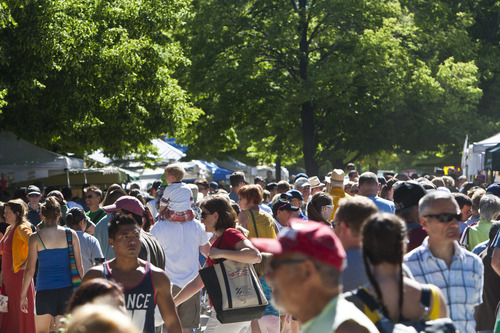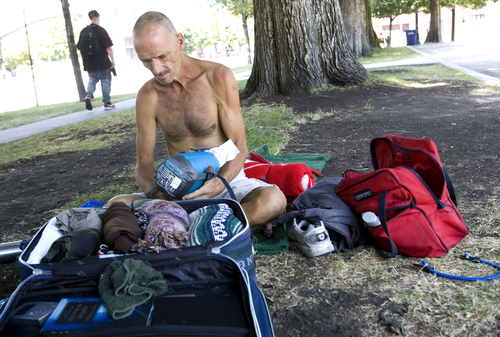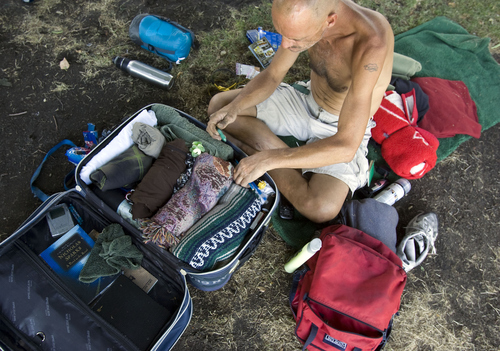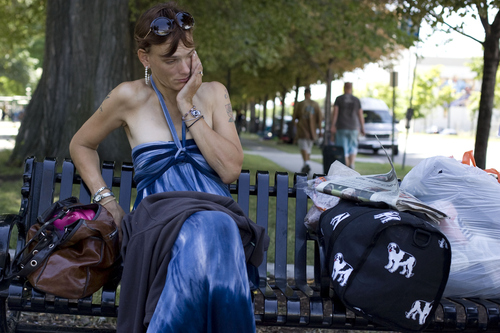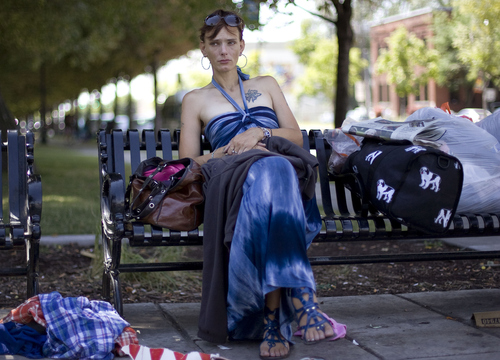This is an archived article that was published on sltrib.com in 2013, and information in the article may be outdated. It is provided only for personal research purposes and may not be reprinted.
The two faces of Pioneer Park couldn't be more different: One is healthy and happy; the other is down and desperate.
Each Saturday morning during the summer harvest season, nicely dressed shoppers with strollers and dogs roam the park's Farmers Market seeking the healthiest foods money can buy.
But by Saturday evening, its unofficial residents have returned, seeking a place to camp, looking for a drug fix or just struggling to make it through another day living on the street. In this world, which includes addicts and the mentally ill, violence is a way of life.
It isn't a new phenomenon. Quite the contrary, it is one that won't go away. It has demanded attention for decades and caused heartburn for Salt Lake City Mayors Palmer DePaulis, Deedee Corradini, Rocky Anderson and Ralph Becker.
At a recent City Council budget hearing, Jason Mathis, executive director of the Downtown Alliance business group, pleaded for money for the challenges facing Pioneer Park and its homeless population.
It isn't that Salt Lake City and a host of service providers from shelters to soup kitchens, from clinics to mental health programs, haven't worked for decades to pull up the folks who have fallen off the bottom rung of the socioeconomic ladder. Many groups have worked tirelessly. And some progress has been made.
Construction of permanent housing expressly for the homeless, along with coordination among various agencies during the past decade, yielded significant strides toward bringing some of the chronic homeless back into the mainstream, said Karen Hale, Becker's communications director.
And the park has been home to new programs, like Friday night movies, yoga classes, bocci clubs, tennis groups and the Twilight Concert series. Not least, security cameras were put up throughout the park. City residents were reclaiming the green space — until recently.
"People were seeing a noticeable change. It was refreshing to see the park change just a bit," Hale said. "But, lately, people are seeing the park slip back to the way it was before."
It could be the poor economy or cutbacks in federal and state funding for homeless programs. Whatever it is, the homeless population around the park and downtown looks to be on the upswing.
For example, Karren Cardenas, 38, originally from Draper, recently lost her apartment at the Rio Grande Hotel. Sitting on a park bench, her worldly belongings stuffed into a duffle and a few plastic bags, she wept.
"They look down on homeless people," Cardenas said. "They think they are better than we are."
Cardenas said she qualified for permanent housing after a two-year stint at the Utah State Prison on a drug conviction. She has been on and off the streets since age 18 and said she suffers from "mental problems."
She has no idea how to find treatment, how to find services or how to get housing. And Cardenas has no plans — not even about her next meal.
"I'm just going with the flow," she said. "I hope some friends will let me stay at their house or their campsite."
There is no shortage of such stories at Pioneer Park.
Dustin Byrd, 36, and his wife, Abby, 34, are on the street. They were kicked out of The Road Home shelter for 30 days after they had a domestic dispute and argued there. Now, they are camping in Pioneer Park.
Originally from Utah, the couple and their four children were living in Oklahoma, where Dustin was employed. But he lost his job and their place of residence, and they returned to Utah.
Both were former heroin addicts and found themselves using the drug again during their stay at the shelter. Their children were taken away, and the two say they want treatment for their addiction and hope to get their children back. But they don't know where to get treatment and seem at a loss about what to do next.
A new program by Salt Lake City could help. On Wednesday, from 12:30 p.m. to 4 p.m., service providers will go to the park to help the homeless find programs that could help. It is being organized under Salt Lake City Police Department's Homeless Outreach Service Team (HOST).
Sgt. Michelle Ross said police have adopted policies through the decades that seek to help the homeless people they contact on the street.
Of course, if laws are being violated, arrests will be made. But a cycle of arrest, jail, release, warrant, jail does nothing to change social ills, she said.
"You can't think you are going to arrest your way out of a social problem [like homelessness]," she said.
Salt Lake City officials say they are not seeking to displace the homeless from the area, but, rather, find permanent solutions for them.
Officers talk to the homeless to see if they are aware of programs offered by various agencies, Ross explained. The city is working with those agencies to better coordinate outreach to that population.
But it's not a simple problem. For every person like, Cardenas or Byrd, who would accept help, there is one like Jeff Skog, 34, also from Utah.
He doesn't mind camping out, particularly in the warm months.
"During the summer, I like being out," Skog said. "During the winter, it's harder."
Skog presents himself as street smart and says he knows how to make money. He appears satisfied, if not happy, with the lifestyle.
"You always have to be aware of your surroundings," he said. "I just got robbed the other night. I got strong-armed at knifepoint."
But, according to Ross, even guys such as Skog will reach a point at which they are willing to accept help.
"Sometimes it takes 20 years for someone to say, 'I'm tired of this. I'm ready to go.' "
Outreach planned at park
Salt Lake City Police Department's Homeless Outreach Service Team is staging an outreach program Wednesday from 12:30 to 4 p.m. at Pioneer Park, 300 W. 400 South, so service providers can help homeless people find programs that could help them.


